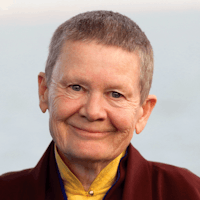Compassion is not a relationship between the healer and the wounded. It’s a relationship between equals.
Compassion is not a relationship between the healer and the wounded. It’s a relationship between equals.
Pema Chödrön

A Relationship Between Equals
Theme: Compassion
We cultivate bravery through making aspirations. We make the wish that all beings, including ourselves and those we dislike, be free of suffering and the root of suffering. We use the same seven-step aspiration practice to soften our hearts and also to become more honest and forgiving about when and how we shut down. Without justifying or condemning ourselves, we do the courageous work of opening to suffering. This can be the pain that comes when we put up barriers or the pain of opening our heart to our own sorrow or that of another being. We learn as much about doing this from our failures as we do from our successes. In cultivating compassion we draw from the wholeness of our experience—our suffering, our empathy, as well as our cruelty and terror. It has to be this way. Compassion is not a relationship between the healer and the wounded. It’s a relationship between equals. Only when we know our own darkness well can we be present with the darkness of others. Compassion becomes real when we recognize our shared humanity.
Pema Chödrön, born Deirdre Blomfield-Brown on July 14, 1936, in New York City, grew up on a farm in New Jersey. She attended Miss Porter's School before earning a degree in English literature from Sarah Lawrence College and a master’s in elementary education from the University of California, Berkeley. She married at 21 and had two children before experiencing two divorces. Her spiritual journey led her to study Buddhism with Lama Chime Rinpoche in London and Chögyam Trungpa Rinpoche in the United States. In 1974, she was ordained as a novice nun by the Sixteenth Gyalwa Karmapa, Rangjung Rigpe Dorje, and in 1981, became the first American woman fully ordained in the Vajrayana tradition.
Chödrön played a key role in bringing Tibetan Buddhism to the West. In the early 1980s, Trungpa Rinpoche appointed her director of the Boulder Shambhala Center in Colorado. She later moved to Gampo Abbey in Nova Scotia, the first Tibetan Buddhist monastery in North America for Western students, becoming its director in 1986. Recognized as an acharya (senior teacher) in 1993, she continued teaching despite health challenges, including chronic fatigue syndrome. Her books, such as When Things Fall Apart (1996) and No Time to Lose (2005), explore resilience, mindfulness, and compassion, emphasizing shenpa, the habitual grasping that leads to suffering.
In 2020, Chödrön retired from her role as acharya within Shambhala International, citing concerns over the organization’s direction. She continues to teach, lead retreats, and study with her teacher, Dzigar Kongtrul Rinpoche. Recognized for her contributions to Buddhist practice, she received the Global Bhikkhuni Award in 2016. Though she stepped back from institutional leadership, she remains a guiding voice in contemporary Buddhism, emphasizing the power of mindfulness and compassion in daily life.
The Places That Scare You
Chödrön, Pema. The Places That Scare You: A Guide to Fearlessness in Difficult Times. Shambhala, 2001. P. 50

Pema Chödrön
Theme: Compassion
Copyright © 2017 – 2026 LuminaryQuotes.com About Us

—